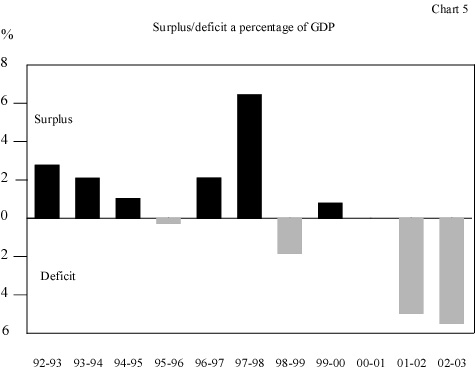 |
Economic Performance and Current Situation
|
Economic Performance
|
| 6. Hong
Kong's economy is on an upward trend. Economic growth in real terms picked up significantly, rising from 0.6% in 2001 to 2.3% in 2002, with the main impetus coming from robust growth in exports of goods and services. Nevertheless, deflation has been more serious than we expected, as evidenced by a drop of 3% in the Composite Consumer Price Index and 2.7% in the general price level of the economy as measured by the GDP deflator. As deflation persisted, local consumption and investment remained weak. The nominal rate of economic growth fell by 0.6% for the whole year, about the same level as forecast last March.
|
|
Chart 1
Hong
Kong's economy on an upward trend in 2002 |
 |
|
Chart 2
Deflation persists |
 |
|
| Fiscal Deficit
|
7. Though the economy has shown signs of improvement in real terms, the Government's huge fiscal deficit, if not resolved early, will dampen investors?confidence and stifle economic recovery. The consolidated deficit for 2002-03 is forecast to be $70 billion, $24.8 billion more than the original estimate. This is mainly because government revenue is 19.2% less than originally estimated. Capital revenue is forecast to be $29.1 billion less than the original estimate. This substantial decrease is related to the Government's announcement in November last year to suspend land sales for one year, which has resulted in a $13.9 billion drop in land revenue against the original estimate. Additionally, the Government is studying a merger of the two railway corporations and has postponed the sale of the second tranche of MTR Corporation shares, reducing revenue by a further $15 billion.
|
8. The fact that capital revenue fell short of expectations has no doubt aggravated the deficit but the problem emerged well before this financial year. In four of the past five years, the Consolidated Account registered a deficit. That for 2002-03 amounted to 5.5% of GDP. The Operating Account, which reflects government day-to-day revenue and expenditure, has been in deficit five years in a row, and this has been increasing at an astonishing rate. Excluding investment income from the fiscal reserves, the operating deficit hit $67.6 billion in 2002-03, equivalent to 5.3% of GDP.
|

|
|

|
|

|
|
|
|